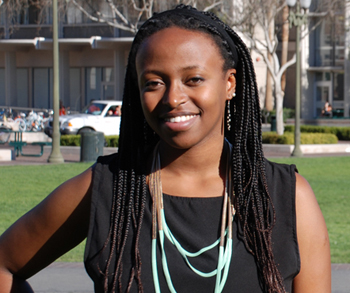
Rose Twagiramariya
Twenty years after her family fled the Rwandan genocide, Rose Twagiramariya has returned to Rwanda to work for USC Shoah Foundation.
Twagiramariya was born in Rwanda and left with her family in July 1994 during the genocide, when she was six years old. The family lived in a refugee camp in the Congo, Senegal, and Maryland before settling in Louisville, Kent., in 1999.
Twagiramariya received her master’s in public diplomacy from the University of Southern California in 2012. During her first semester, she worked with Donald E. Miller, professor of religion and executive director of the USC Center for Religion and Civic Culture, to create an annotated bibliography for his book about child survivors of the Rwandan Tutsi Genocide and post-traumatic stress disorder.
Though she had always sworn she would never set foot in Rwanda again for fear of triggering painful memories, reading about the Rwandan Genocide and the country today changed her mind, she says.
Twagiramariya interned at the Shoah Foundation with Karen Jungblut, director of research and documentation, to index new Rwandan testimonies. A year later, Twagiramariya was hired as a project manager for the Shoah Foundation’s IWitness in Rwanda program. She is responsible for the implementation of both in-class program activities and professional development. Since the project is a partnership between the Shoah Foundation and the Aegis Trust Rwanda, she is also a liaison between the two organizations for their joint initiatives, including the recently-launched Rwanda Peace Education Program.
One of the biggest challenges IWitness in Rwanda faces is the lack of internet connection or computers in many schools, Twagiramariya said. However, at the African ICT conference in Accra, Ghana, in February 2013, Rwandan officials announced that all secondary schools will be connected to the internet by 2017.
Twagiramariya said it is rewarding to see the impact IWitness is already having on teachers in Rwanda. Many of them have trouble teaching about the genocide because of the sensitive nature of the topic and because they feel they lack the resources.
“I’m glad to say that I am consistently seeing teachers who are genuinely interested and enthusiastic about IWitness and the use of testimonies in their classrooms and remain eager about bringing it to their schools, whether or not they have the proper infrastructure,” she said.
Moving back to Rwanda after 20 years has brought some unexpected challenges, Twagiramariya said. After being away for so long, she has felt like somewhat of an outsider in her home country, though she’d hoped to feel that she belonged there more than she did growing up in the United States.
However, she’s realized that it’s all right to exist “somewhere in between” both Rwanda and America.
“Now, I’m learning to be comfortable with the various aspects of my identity without feeling like I’m betraying myself in any way,” she said.
Twagiramariya said she feels that working in genocide awareness and prevention in Rwanda is her responsibility and her calling. Though the phrase “Never Again” is used constantly to warn against future genocides, it isn’t often put into practice, and that’s something Twagiramariya wants to change.
“I remember being that six-year-old girl who was expecting to die at any minute and I wouldn’t wish that on anyone,” Twagiramariya said. “The Shoah Foundation’s mission of collecting testimonies for future generations as well as empowering individuals to tell their stories and lead both action and education is remarkable and I know firsthand what a transformative experience watching a testimony can be.”